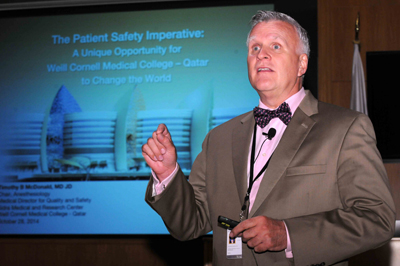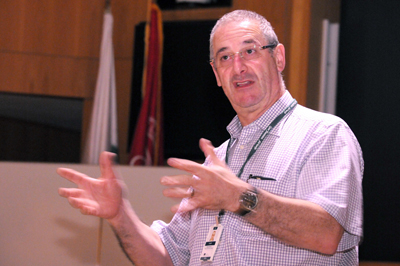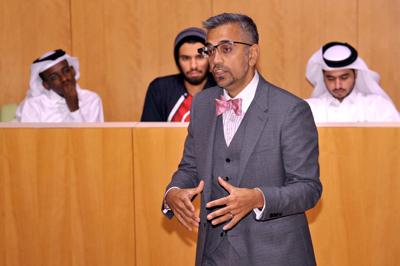Career seminars help Foundation students chart the road ahead
December, 2014

Dr. Timothy McDonald gave the Foundation students
an overview of his area of expertise, anesthesiology.
Foundation students gained insights into the many career paths open to them thanks to a season of seminars given by senior faculty and healthcare professionals from WCMC-Q and Sidra Medical and Research Center.
The Foundation Program Career Seminar Series, coordinated by Dr. Rachid Bendriss of WCMC-Q’s Pre-Medical Education Division, brought five departmental leaders from Sidra to the college to speak about careers in anesthesiology, hematopathology, radiology, obstetrics and gynecology, and musculoskeletal imaging.
The seminars, held weekly from September 2014 onwards, also featured presentations by WCMC-Q faculty members Dr. Stephen Scott, Associate Professor of Family Medicine and Associate Dean for Student Affairs; Dr. Mohamud Verjee, Associate Professor of Family Medicine; and Dr. Amal Khidir, Assistant Professor of Pediatrics.
Dr. Rachid Bendriss, WCMC-Q’s Assistant Dean for Student Recruitment, Outreach and Foundation Programs, explained the aims of the Career Seminar Series.
He said: “We believe it is extremely beneficial for our students to meet and hear from practicing healthcare professionals at this early point in their medical education because it helps them begin to think about what direction they want to take with their own careers. Hearing from speakers who are clearly passionate and enthusiastic about their work is truly inspiring for our students, and learning about a wide range of specialties is very helpful because they might discover an area of medicine that really captures their interest and imagination.
“Having an end-goal to aim for can be an extremely powerful tool for sustaining the students through their medical training.”
Each of the seminars featured a presentation in which the speakers outlined the main characteristics of their fields of medicine, discussed the technology they use and explained the ways in which they interact with other medical professionals to deliver care. Students then took part in an interactive question and answer session with the speakers to learn more about the subject.

Dr. Graham Biurski's seminar enthused the students with
news of the latest technological advances in medical imaging.
Foundation Program student Kholoud Abu-Holayqah welcomed the opportunity to discover more about the myriad career options available to her. She said: “We got to know about a lot of different specialties and to examine the advantages and challenges of each and every one of them. Personally, I found it really useful to get an idea of what I should expect my day-to-day working life to be like if I decide to pursue a career in one of the specialties.
“I was also very encouraged to see just how inspired the speakers were when they talked about their work, even after 10 or 20 years of working in that field. It gives me confidence that I can have a career that will be intellectually stimulating for many, many years, which is great to know.”
Career Seminar Series: Speaker Profiles
Seminar 1: Dr. Stephen Scott, Associate Professor of Family Medicine, WCMC-Q
Dr. Scott’s talk was entitled ‘Five things you should know about me’ and charted his path to medicine, as well as documenting various influences and decisions that have shaped his career over the years.
Dr. Scott said: “A career in medicine is incredibly rewarding and full of opportunities. Itís important to take time along the way to explore your interests and consider which of the many career paths open to you will be the most fulfilling and stimulating.”
Seminar 2: Dr. Mohamud Verjee, Associate Professor of Family Medicine in Clinical Medicine, WCMC-Q
Dr. Verjee used his presentation to evoke the spirit of humanitarianism embodied by a career in medicine, and to explain that for many physicians medicine is a vocation that they feel drawn to.
Dr. Verjee said: “You may recognize within yourselves a strong urge to heal and to help others. I urge you to listen to that inner voice, to nurture those feelings and to make the very best use of them by learning and practicing medicine with humility for the good of those in the community who need your help.”
Seminar 3: Dr. Amal Khidir, Assistant Professor of Pediatrics, WCMC-Q
Dr. Khidir spoke about the rewarding nature of a career in pediatric medicine, as well as the challenges posed by the specialty. Dr. Khidir also gave the students general advice to help them benefit fully from their medical education.
She said: “Be sure to make full use of the resources and support systems available to you during your time here at WCMC-Q, and to accept the help offered by your own family and friends. Analyze your academic character so that you may build upon your strengths and address any weaknesses you may have. Have a positive attitude, believe in yourselves and never be afraid to ask for help when you need it. And always remember, there is no such thing as a silly question.”

Dr. Jason Ford gave the students valuable insights into
pursuing a career in pathology.
Seminar 4: Dr. Timothy McDonald. Chair, Department of Anesthesiology and Medical Director for Quality and Safety, Sidra Medical and Research Center
Dr. McDonald gave the students an overview of anesthesiology, explaining how anesthesiologists interact with patients and other physicians, particularly surgeons.
Seminar 5: Dr. Graham Buirski. Section Head of MusculoSkeletal Imaging, Sidra Medical and Research Center
A specialist radiologist and medical imaging expert with 25 years of experience working in hospitals in Australia and the UK, Dr. Buirski outlined the various technologies used for medical imaging, such as magnetic resonance imaging (MRI), computerized tomography (CT) scans, ultrasound and X-rays. Dr. Buirski also explained the central role of radiologists in care teams.
He said: “Medical imaging not just about working with fantastic pieces of very sophisticated technology, although that is one extremely fascinating aspect of it. It is also about the skillset that radiologists develop, which surgeons and consultants can draw upon for the benefit of their patients Ė for example, radiologists are extremely familiar with human anatomy and are often more adept at identifying abnormalities and pathologies than specialists, which is a very valuable skill. This helps to make medical imaging a truly rewarding and fulfilling career.”
Seminar 6: Dr. Jason Ford. Division Chief of Hematopathology and Vice Chair, Department of Pathology, Sidra Medical and Research Center
Previously the Head of the Division of Hematopathology at the Children’s and Women’s Health Center of British Columbia, Vancouver, Dr. Ford is responsible for establishing world-class laboratories in hematology and transfusion medicine at Sidra. He used his presentation to give the students insight into the nature of pathology as a specialty, with particular regard to hematopatholgy, the study of diseases of the blood cells.

Dr. Deepak Kaura challenged the students to envisage how the
world of medicine will change when technological advances allow
the human genome to be mapped for just $100.
Seminar 7: Dr. Deepak Kaura. Chair, Department of Radiology, Sidra Medical and Research Center
Dr. Kaura spoke about the role of radiology in diagnosis and monitoring of diseases, and more broadly about the rapid advances in technology that are changing the way modern medicine is practiced.
He said: “Iím here to help you to understand what a satisfying and intellectually stimulating career you can have working in the field of radiology. Whatís more, radiology is going to become even more fascinating as the next few years are going to be an incredibly exciting and truly transformative time, thanks to advances in technology. For example, advances in computing power mean that mapping of one human genome that used to take around ten years and cost about $1 million can now be done in ten days and costs just $1,000. By the time your finish your studies it could take ten hours and cost $100 Ė just imagine how this wealth of data we will be able to access will transform the way medicine is practiced.”
Seminar 8: Dr. Paul Ogburn. Chair, Department of Obstetrics and Gynecology, Sidra Medical and Research Center
Dr. Ogburn explained the role of obstetricians in protecting the health of pregnant women and their unborn children.
He said: “Our ultimate goal is to ensure that we have a healthy mother and normal, healthy development of the baby. This is achieved in a number of ways. For instance, it is critical that mothers obtain sufficient amounts of essential fatty acids in their diets, as they are very important for the development of the babyís brain. We must also monitor expectant mothers carefully so that any problems are diagnosed early so that we can make the correct interventions to safeguard the health of mother and baby as effectively as possible.”
